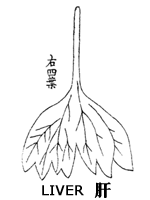Liver Functions
- Liver rules flowing and spreading
- Liver stores blood
- Liver opens into the eyes
- Liver rules the tendons and is manifested in the nails

In western physiology, the liver is responsible for a number of important body functions, including the production and excretion of bile, which is used to break down fat and the detoxification of blood. However, according to TCM, the liver’s functions are different. They include control of the central nervous system, the autonomic nervous system (the part of the nervous system over which a person does not have voluntary control), and the circulatory system. In addition, the liver is responsible for vision.
Liver rules flowing and spreading
In TCM, the liver promotes flowing and spreading actions. By stimulating flow, the liver adjusts and ensures the smooth movements of qi, blood and body fluids, and spreads these substances to the entire body. There are three functional aspects of the liver’s “flowing and spreading” activity: regulating qi, regulating emotions and enhancing the digestive properties of the spleen.- Regulating qi movement
The activities of the organs and meridians are dependent on qi movement. The flow and spread of qi throughout the body are in turn dependent on the regulatory functions of the liver. If the liver is not functioning properly, qi flow is interrupted, which can lead to disharmony and imbalance. When this becomes marked, disease and other health problems ensue.
- Regulating emotions
The liver balances emotions. Normal emotional health depends on the harmony of qi and blood. When the liver keeps qi flowing smoothly, a relaxed internal, emotional environment is created. If liver disharmony results in stagnant liver qi, emotional disturbances like a sentimental mood, depression and irritability can occur.
- Enhancing the digestive power of spleen
Food digestion and absorption rely on spleen, and the liver’s flowing and spreading functions help adjust these functions in spleen. If the liver is not functioning properly, the movement of spleen qi is not smooth. Consequently, the transformation and transportation of digested food will be affected, leading to abdominal pain, nausea, belching, diarrhea and other complications.
Liver stores blood
The liver is also responsible for storing blood and regulating blood flowing in the periphery body. When a person moves or exercises, blood flows out of the liver and goes to the part of body that needed. The blood returns to the liver to be stored, when a person rests. If a person has inefficient blood storage in the liver, there may be bleeding problems like vomiting blood, nasal bleeding, or excessive menses in women.Liver opens into the eyes
Liver rules the tendons and is manifested in the nails
The proper movement of tendons, ligaments and related soft tissues which attach muscle to bone is closely related to liver function. If the blood stored in the liver is insufficient and incapable of nourishing the tissues, symptoms like spasms, numbness of limbs and difficulty bending or stretching occur. Nails are viewed as the residues of tendon and ligament on the body surface in TCM. Fingernail and toenail health is also dependent on the nourishment of blood from the liver. If the liver blood is sufficient, nails will appear strong and healthy looking. If it is insufficient, the nails will become deformed, brittle, pale or discoloration. Click here to read more about the Liver Meridian


